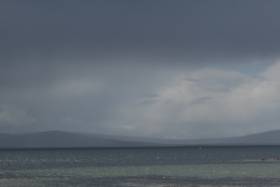Displaying items by tag: FoodChain: Oceans
Marine Institute Supports Ireland’s Commitment to Ban Microbeads
#MarineScience - The Marine Institute supports Ireland's commitment to introduce national legislation that will prohibit the sale and manufacture of certain products containing microbeads.
Dr Peter Heffernan CEO of the Marine Institute, was recently interviewed on RTE Morning Ireland (see related report) about the potential harmful effects of the tiny pieces of plastic known as 'microbeads' entering our oceans.
"The key risk about microbeads is the potential to get into the food chain - something that small can be eaten by small microorganisms at the base of the food chain in the ocean and eventually end up in products that humans eat," Dr Heffernan said.
"It is globally a significant issue, especially when you consider that 97 percent of the Earth's water is in the ocean and half the oxygen we breathe comes from the ocean. There is an existential relationship between the health of human life on planet earth and the health of our oceans."
At the Our Ocean Conference held in Malta on 5-6 October 2017, Minister of State Ciarán Cannon TD delivered Ireland's national commitments to promote and protect the world's marine resources. Ireland reaffirmed that by the end of 2018 it will introduce national legislation to prohibit the sale or manufacture of certain products containing microbeads, including not just cosmetics but also body care and cleansing products as well as detergents and abrasive surface cleaning products.
"We are at a very early stage, globally, in understanding the scale of the risk and even the pathways of the plastic into the food product. Ireland has been very quick off the ground with research undertaken in Galway Bay, off the continental shelf, and in the very deep continental waters," Dr Heffernan said.
The Marine Institute has committed €446,000 in funding to three international microplastics projects, through JPI Oceans - the Joint Programming Initiative Healthy and Productive Seas and Oceans, via three Irish partners – University of College Cork (UCC), Galway Mayo Institute of Technology (GMIT) and National University of Ireland, Galway (NUI Galway).
The Marine Institute is a research partner in the CleanAtlantic – Tackling Marine Litter in the Atlantic project, working with partners from Spain, France, Portugal and the United Kingdom. The EU funded CleanAtlantic project aims to protect biodiversity and ecosystem services in the Atlantic Area by improving capabilities to monitor, prevent and remove (macro) marine litter.
Research on microplastics has also been undertaken by scientists on board the Marine Institute's two research vessels, the RV Celtic Explorer and the RV Celtic Voyager. In April 2014, PhD student Amy Lusher from GMIT, researched the distribution of microplastics in the Atlantic Ocean, on a RV Celtic Explorer voyage from Galway to St Johns Newfoundland. On board the RV Celtic Voyager in October 2015, Dr Audrey Morley from NUI Galway conducted the first assessment of microplastic pollution in marine sediments taken form the Irish continental shelf. Recently, in December 2017, a team from GMIT's Marine and Freshwater Research Centre (MFRC) were on board the RV Celtic Voyager to carry out a survey of microplastics in Galway Bay.
Dr Peter Heffernan said the scale of plastic pollution in our ocean is alarming and our current human behaviours need to change.
"We have got to change human behaviour, we have got to change manufacturing and industrial behaviour. We have personal choice in this; we can choose not to use single-use plastics. We can choose to identify where products contain microbeads and decide at a personal level not to use them. That is a very powerful signal to the market," Dr Heffernan said.
The European Commission today adopted the Europe-wide strategy on plastics to protect the environment from plastic pollution while fostering growth and innovation. Under the new plans, all plastic packaging on the EU market will be recyclable by 2030, the consumption of single-use plastics will be reduced and the intentional use of microplastics will be restricted.






























































